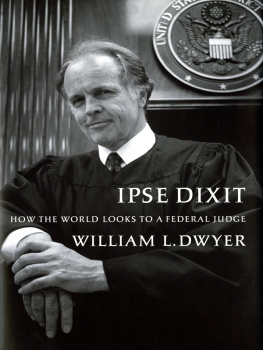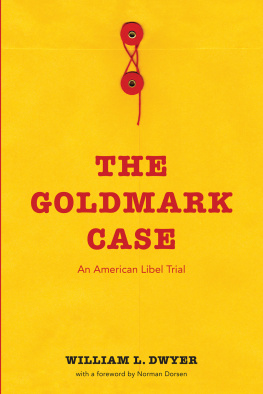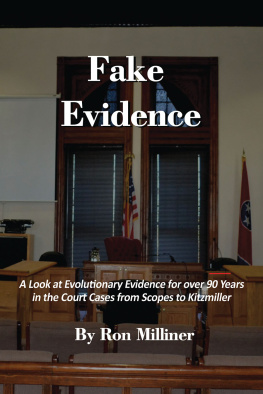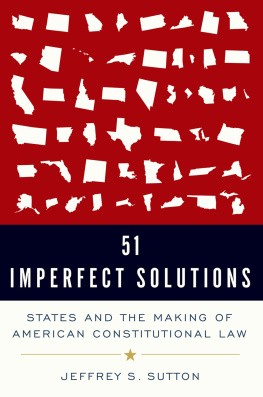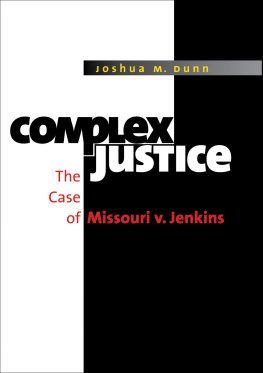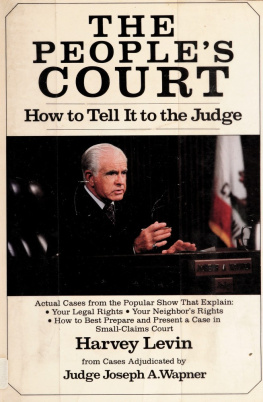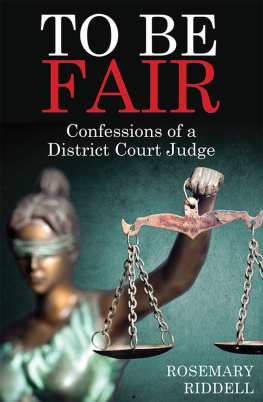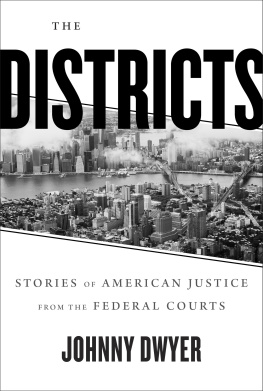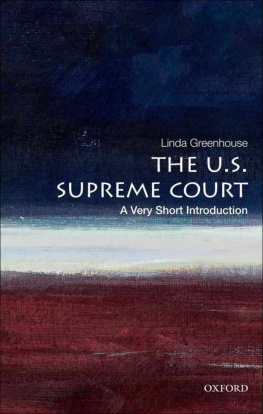All rights reserved. No part of this publication may be reproduced or transmitted in any form or by any means, electronic or mechanical, including photocopy, recording, or any information storage or retrieval system, without permission in writing from the publisher.
The paper used in this publication is acid-free and 90 percent recycled from at least 50 percent post-consumer waste. It meets the minimum requirements of American National Standard for Information SciencesPermanence of Paper for Printed Library Materials, ANSI Z39.481984.
Foreword
MEADE EMORY
SEVERAL TIMES IN MY LEGAL CAREER MY PATH HAS intersected with William Dwyer's. I was asked in 1986 to testify before the Senate Judiciary Committee in support of his nomination as a U.S. District Court judge for the Western District of Washington. Because I have greatly admired Bill Dwyer throughout my professional life, I enthusiastically seized the opportunity to do so. When University of Washington Law School Dean Roland Hjorth decided to create a faculty chair bearing Dwyer's name, the School's Graduate Program in Taxation, of which I was then director, contributed substantially to the chair's endowment fund. The William L. Dwyer Chair in Law was dedicated in 2001, and the first and current occupant is my colleague Stewart Jay. Following Judge Dwyer's death in 2002, it was learned that he had decided not to archive his papers but to let his judicial decisions and opinions speak for themselves. Thus, when it became known that he had left a varied and wide-rangingcollection of speeches given during his distinguished career, I was enormously pleased to help facilitate publication of this important legacy of Bill Dwyer.
Anyone who has followed Bill Dwyer's career, both before and after he went on the bench, knows that somehow he was at the center of this region's most difficult legal issues. When he was in private practice, his noteworthy cases included a libel suit on behalf of John Goldmark, an Okanogan County legislator and rancher, against detractors who had accused Goldmark of Communist sympathies; representation of King County in a dispute with the builder who defaulted on the contract to build the Kingdome in Seattle; pro bono representation of newspaper employees contesting the proposed joint-operating agreement between the Seattle Times and the Seattle Post-Intelligencer; and a suit against the American League that resulted in Dwyer becoming known as the lawyer who brought baseball back to Seattle. The scope and significance of these matters can be attributed to his courage and to the fact that his excellent reputation at the bar brought clients with the most challenging issues to his doorstep.
Since cases are assigned to sitting federal judges on a random basis, the fact that Judge Dwyer's docket drew an inordinate number of the Northwest's truly weighty issues cannot be explained. However, how he dealt with the legal complexity and potentially groundbreaking nature of these cases is permanently writ large on the jurisprudential history of our region. Among the most significant issues that found their way to his court were the spotted owl cases, brought by the Seattle Audubon Society, in which Dwyer ordered the Forest Service to adopt a plan substantially reducing logging in owl habitat areas. The decision in these cases posited our society's fundamental struggle between its ecological conscience and its need to get goods and services from the land. Other issues included a decision declaring Washington State's term-limit law for elected officials unconstitutional because it restricted voters' freedom of choice; a ruling thatMetro (King County's transportation and public utility authority) as then structured was unconstitutional; and, after lengthy hearing, his ordercompliance with which he closely monitoredrequiring state officials to provide adequate mental-health care for civilly committed sex offenders.
An essential reason why Dean Hjorth was eager to create the Dwyer Chair in Law, and why I and others in the Law School were so pleased to honor Judge Dwyer's memory through the publication of these memorable speeches, was Dwyer's love of the legal profession. His profound interest in and respect for legal education went so far as to prompt him to design and teach a course on the history and philosophy of litigation at the Law School, a rare task for any busy practitioner to consider, let alone bring off with stunning success. This devotion clearly manifested itself in Judge Dwyer's remarks at the dedication of the Chair being named for him, at which time he spoke of the legal profession's camaraderie, its challenges, its opportunities for adventure, and its ever renewed invitation to give the best that is in us. While Judge Dwyer recalled the utility of the Socratic method in learning how to think like a lawyer, he correctly noted that the legal education formula at the time he went to law school was weak on the big picture, whereas today's course catalog reads like a fascinating itinerary through the wide world of the law. Dwyer noted that in his days at the UW Law School, the student body and faculty were composed almost entirely of white males, and he heralded the winds of change that brought about real diversity, noting that in the early twenty-first century, for example, half the students are women and about a fourth are minorities.
Observing that up to three-fourths of the legal needs of poor Americans go unmet and that the legal profession's members need to give generously of their time and talent to remedy the situation, Dwyer noted that most of us are too busy, adding, pivotally, or think we are. His shrewd knowledge of the profession was evident in his statement that as lawyers and judges we habitually concentrateon the work at handthe trial in progress, the document to be drafted, the negotiation to be conducted, rather than seek to comply with the aspirational statements of the canon of ethics, which, in his words, urges all members of the bar to donate substantial working time to pro bono services. His knowledge of what goes on in legal education at the University of Washington elicited his comment that its Law School set a sterling example when its students a few years agovoted to impose on themselves a requirement for graduation of at least sixty hours of public service work and that that program has been a tremendous success. The strong implication of this is, of course, that if law students can be so motivated, why can't those who are the stewards and trustees of the legal system, as he put it, do the same?
The speeches collected in this volume are neither dry nor pedantic. Rather, they reveal the breadth and scope of Bill Dwyer's interests and wisdom. No hubris or egotism is displayed in these pages. In this regard much is learned about the kind of man he was from his comment that once off the bench at the end of the day, it is gratifying to find one's anonymity has survived almost intact. These short but interesting talks also lack histrionics and are marked by the use of the simple language and infallible logic that Gordon Culp, Dwyer's longtime law partner, says Dwyer used in daily discourse, both in and out of the courtroom. Judge Robert Lasnik, a colleague on the local federal bench, noted that there was no hierarchy for Bill Dwyer, he was great to everybody. His reputation for fairness, integrity, and intelligence was so broadly recognized that it was perfectly appropriate, in an age rife with lawyer-bashing humor, for Seattle lawyer Egil (Bud) Krogh Jr. to view Bill Dwyer as having helped redeem our profession through the respect, bordering on reverence, that he enjoyed.

